MESSAGE FROM PRINCIPAL
2025-2026
Good morning, teachers and students. It is my great pleasure to address you all this morning as we reunite with our big family. A very warm welcome to our newest members, including all our S1 students and some newly-admitted students of other levels. We're so thankful for God’s blessing on our school reopening ceremony.
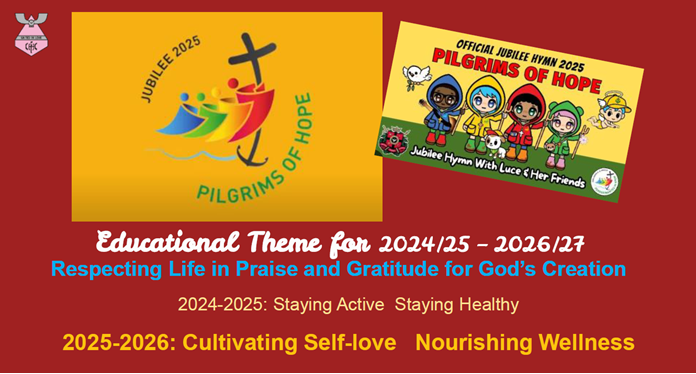
Before the start of the opening ceremony, you heard a song called “Pilgrims of Hope,” which serves as the official hymn for the 2025 Jubilee in our Catholic Church. In fact, all our Catholic students have listened to the Chinese version of this song during Mass at their church. I would like to introduce this song to you all, as it aligns with our school's focus this year. Under our Educational Theme for 2024-2027, “Respecting Life in Praise and Gratitude for God’s Creation,” we were encouraged to stay active to maintain our overall well-being in the past school year. This focus remains crucial, as staying active is a direct expression of care and respect for your body. Understanding the importance of prioritising your body’s health is a profound demonstration of self-love. After all, self-love is about being kind to yourself and treating yourself with compassion. This directly connects to our current yearly theme, “Cultivating Self-love, Nourishing Wellness,” which builds upon the foundations laid in last year’s focus.
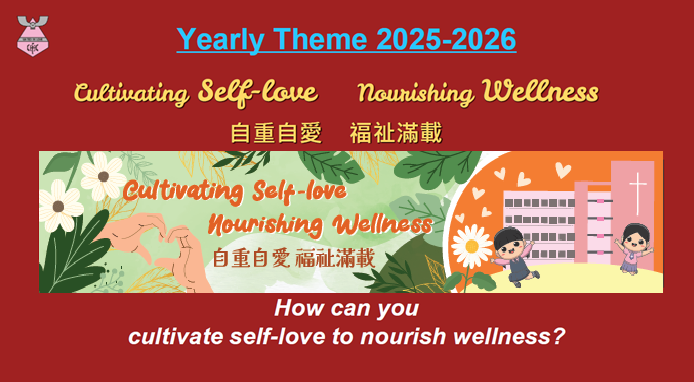
Returning to the hymn “Pilgrims of Hope” that I played for you, it speaks of hope and faith, like a burning flame igniting our lives, accompanied by self-love and reflection on our life’s purpose as an inner journey. Cultivating self-love involves building our resilience and trusting in our own worth and capacity, even amidst challenges. Upon deeper reflection, the “hope” in the hymn represents an inner spiritual strength that enables us to face life with optimism and self-belief. We learn to rebound from setbacks and maintain a positive outlook, which is a fundamental aspect of self-love and wellness. We should place our faith in God and ourselves, nurturing hope as we move forward and embrace the future. I believe you now have a preliminary understanding of what “self-love” entails. Now, let me ask you: how can you cultivate self-love to nourish your wellness? Here are four examples.
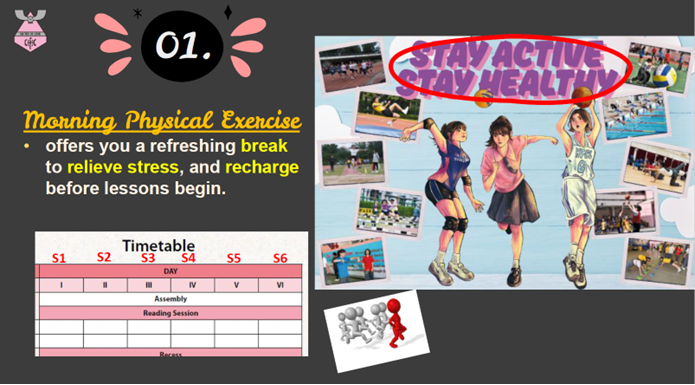
The first example is “Staying Active, Staying Healthy.” As I mentioned earlier, prioritising your body’s health is a clear expression of self-love. You are encouraged to participate in the class-based morning physical exercise conducted right after class affairs and continuing until the end of reading time, just like last year. To provide more opportunities for you to engage in this activity, each grade level will have a designated day per cycle. For instance, morning exercise for each class of Secondary 1 may take place on Day 1, Secondary 2 on Day 2, Secondary 3 on Day 3, and so forth. Your Class Teacher will provide you with more information about the arrangements. This morning physical exercise offers a refreshing break to relieve stress and recharge before lessons begin. Additionally, our lunchtime programs during the second half of lunch can also offer you opportunities to relax or help you cultivate a healthy lifestyle by engaging in sports activities daily.
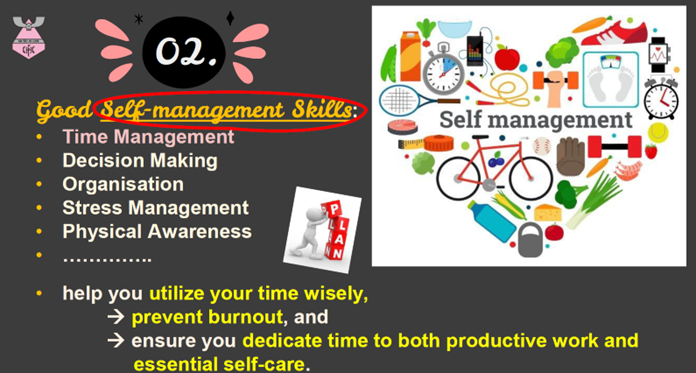
The second example is self-management skills. If you value your well-being or wish to treat yourself kindly, you must understand the importance of balancing your studies with rest, hobbies, and social connections. Effective self-management skills enable you to utilise your time wisely, prevent burnout, and ensure you dedicate time to both productive work and essential self-care. Moreover, our teachers have noted that a stressed or unwell student often struggles with academic performance and other personal challenges. Indeed, wellness enhances focus and efficiency. This means that when you are well-rested, physically active, and mentally balanced, you are better equipped to concentrate, organise your tasks, and achieve your goals efficiently.
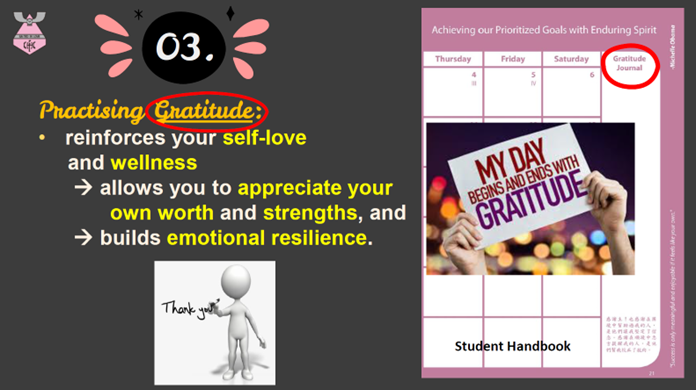
The third example involves the practice of gratitude. Gratitude reinforces your self-love and wellness, allowing you to appreciate your own worth and strengths while building emotional resilience. When you are kind to yourself, you are more likely to recognise the kindness you receive from others and appreciate the positive experiences around you, rather than taking things for granted. Conversely, a stressed, exhausted, or overwhelmed student is less likely to notice or value the positive aspects of their environment, resulting in lower levels of optimism and overall happiness. Make effective use of your Student Handbook to maintain your practice of a Gratitude Journal regularly. You will be rewarded for proactively sharing your Gratitude Journal with your Class Teachers.
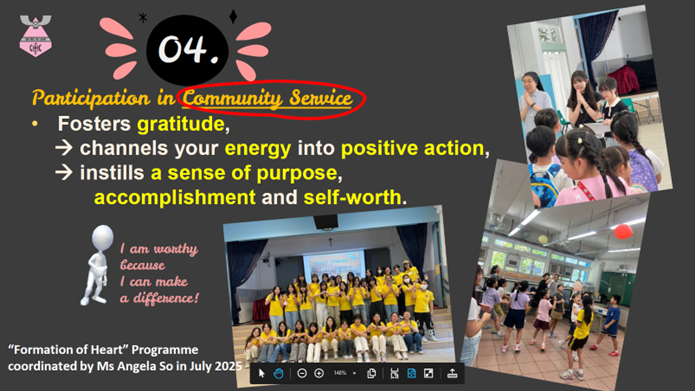
The final example is engaging in community service. Participating in community service fosters gratitude, channels your energy into positive action, and cultivates a deeper understanding of diverse life experiences, enhancing your genuine empathy and self-worth through meaningful contributions. When you engage in community service, you witness the positive impact of your actions, which instills a sense of purpose, accomplishment, and self-worth. This feeling of being valuable and capable is a cornerstone of self-love. You may find yourself thinking, “I am worthy because I can make a difference.” Consider joining our Holy Family Service Team coordinated by Ms Valerie Cheung and Ms Melody Mok, the Caritas Bazaar organised by our Guidance Team this year, or our Joint-Canossian School “Formation of Heart” Programme coordinated by Ms Angela So, to embrace the opportunities for community service.
Soon, two groups of students will be invited to share their perspectives on this year’s theme with you. The first group consists of members from the Head Girl Core Group, while the second group includes representatives from the School Educational Trip held during the summer. Their insights will illuminate the importance of embracing well-being through self-love.
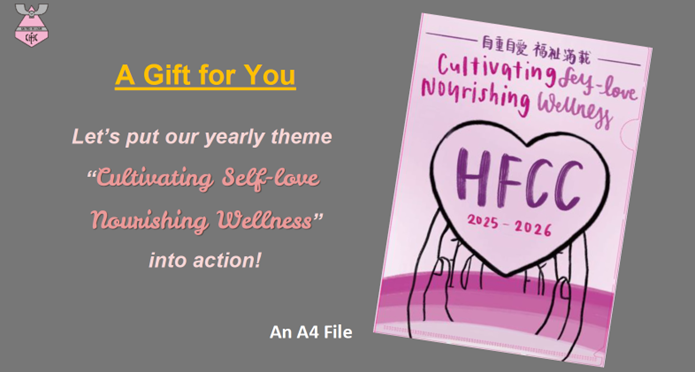
When you return to your classroom shortly, you will receive this file featuring our yearly theme, presented as a gift to mark the beginning of the new school year and to serve as a reminder for you to put the yearly theme into action.
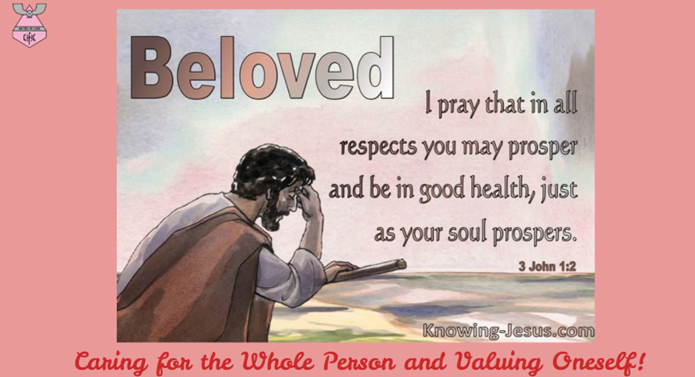
I would like to conclude today’s sharing with a quote from the Bible. According to the Third Epistle of John, Chapter 1, Verse 2, it states, “Beloved, I hope you are prospering in every respect and are in good health, just as your soul is prospering” (3 John 1:2). This verse expresses a heartfelt wish for holistic well-being, highlighting good health alongside the flourishing of the soul. It emphasises that God desires our well-being in all aspects—physical, mental, and spiritual. This reinforces the notion that true wellness encompasses not only spiritual health but also physical vitality. It beautifully aligns with our yearly theme by highlighting the significance of caring for the whole person and valuing oneself.
I wish you all a blessed, healthy, and fruitful new academic year. Thank you, and may God bless you all.


